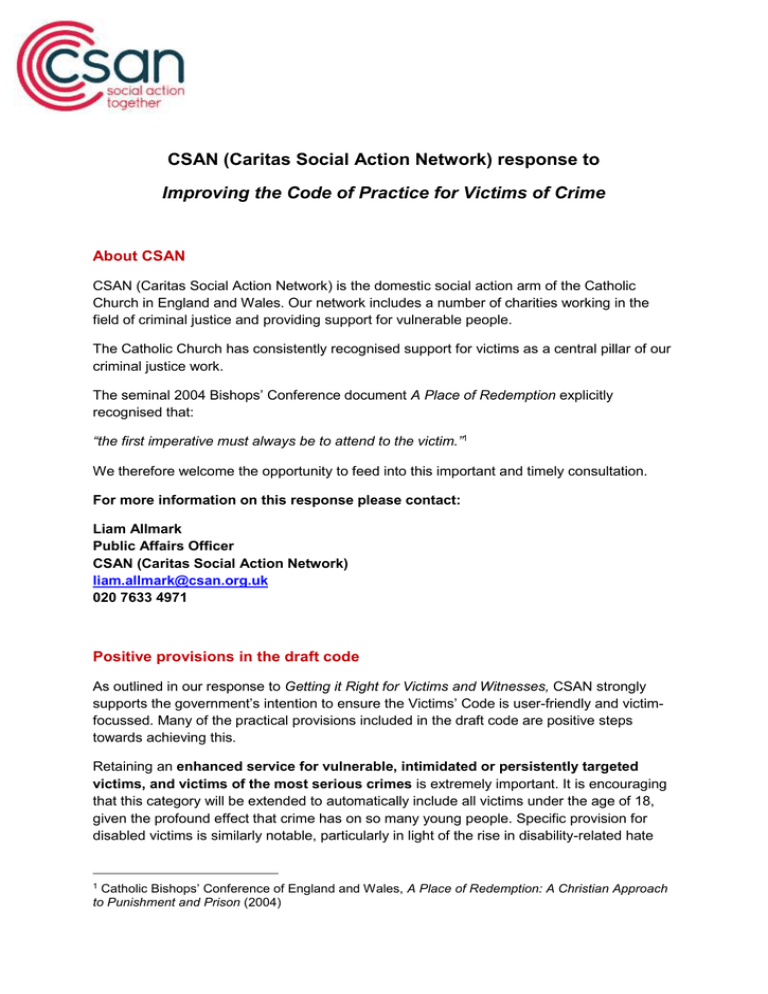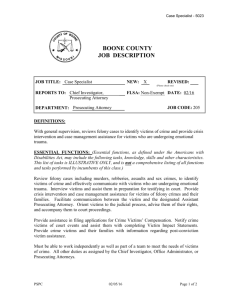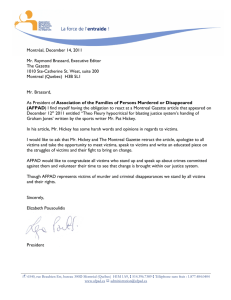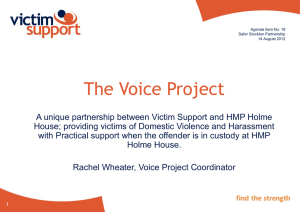CSAN response to Improving the Code of Practice for Victims of Crime
advertisement

CSAN (Caritas Social Action Network) response to Improving the Code of Practice for Victims of Crime About CSAN CSAN (Caritas Social Action Network) is the domestic social action arm of the Catholic Church in England and Wales. Our network includes a number of charities working in the field of criminal justice and providing support for vulnerable people. The Catholic Church has consistently recognised support for victims as a central pillar of our criminal justice work. The seminal 2004 Bishops’ Conference document A Place of Redemption explicitly recognised that: “the first imperative must always be to attend to the victim.”1 We therefore welcome the opportunity to feed into this important and timely consultation. For more information on this response please contact: Liam Allmark Public Affairs Officer CSAN (Caritas Social Action Network) liam.allmark@csan.org.uk 020 7633 4971 Positive provisions in the draft code As outlined in our response to Getting it Right for Victims and Witnesses, CSAN strongly supports the government’s intention to ensure the Victims’ Code is user-friendly and victimfocussed. Many of the practical provisions included in the draft code are positive steps towards achieving this. Retaining an enhanced service for vulnerable, intimidated or persistently targeted victims, and victims of the most serious crimes is extremely important. It is encouraging that this category will be extended to automatically include all victims under the age of 18, given the profound effect that crime has on so many young people. Specific provision for disabled victims is similarly notable, particularly in light of the rise in disability-related hate Catholic Bishops’ Conference of England and Wales, A Place of Redemption: A Christian Approach to Punishment and Prison (2004) 1 crime during recent years.2 The code’s inbuilt recognition that the needs or vulnerability of any victim may fluctuate over time is also a very welcome aspect and is reflective of real-life circumstances. Victim Personal Statements (VPS) provide a crucial mechanism for giving victims a voice in the criminal justice system. There is a clear need for greater understanding of the effect that crime has on individuals and families, and it is therefore important to address current shortcomings such as low numbers of victims being offered the opportunity to make a VPS, lack of integration between criminal justice agencies that can prevent them being properly utilised, and overall confusion regarding their purpose and use. Efforts to rectify these issues through introducing an entitlement to make a VPS at the point of completing an evidential witness statement and clearly specifying its purpose in the code are very welcome, as is the government’s commitment to produce further guidance in this area. Serious consideration should be given to the option of extending these provisions, by giving victims the right to have their VPS read in court should they request it. The Church has long recognised the value of Restorative Justice in offering victims the opportunity for at least some degree of closure, whilst encouraging offenders to both acknowledge the harm they have caused and work to make amends. It is an important step in recognising that all involved must be treated as valuable people with a stake and a voice in society, and has clear practical results for communities as well as individuals. The entitlement for victims to receive information on Restorative Justice is therefore a welcome addition to the code. It is however important that this entitlement is coupled with adequate provision of Restorative Justice services. Given the significant potential to help victims of crime and reduce re-offending, the government should proactively work to expand the supply Restorative Justice services, making them available for all who wish to partake. Victims deserve efficient redress when support services do not meet reasonable expectations. Shifting responsibility for directing complaints to the correct agency, from the victim to the agencies themselves, and obligating criminal justice agencies to respond to complaints in a full and timely manner, are welcome revisions to the code that will make the complaints system more accessible and effective. There remains scope to strengthen the process further, particularly through exploring mechanisms that could compel agencies to take particular actions in addressing complaints and to publish data regarding complaints in a regular and consistent format. Human Trafficking is one of the most severe and horrific violations of human dignity. The transposition of EU Directives relating to trafficking victims and the specific intention to ensure that these victims are treated in a sensitive and appropriate manner by criminal justice agencies is extremely positive. Concerns regarding restrictions to automatic referral Whilst CSAN recognises the importance of providing an enhanced service for vulnerable, intimidated or persistently targeted victims, and victims of the most serious crimes, we do not agree that automatic referral to victims’ services should be restricted to these groups. 2 CPS/ACPO figures (2012) The consultation paper states that “victims who do not want any contact or support from criminal justice agencies should not receive it.” This principle is already reflected in the right of any victim to refuse or opt-out of receiving services as and when they choose; it is unnecessary therefore to limit the offer of services through the framework outlined in the draft code. In practice there is very little difference in requirement for support between victims of ‘high impact’ or ‘low impact’ crimes, and tens of thousands of ‘minor crime’ victims utilise support services each year.3 Whilst the proposed police assessment of needs and vulnerability may go some way towards identifying those who require the most help, a number of people in need will inevitably be overlooked and will not be offered support that they would be under the existing system. It is also highly questionable whether our police forces are currently in a position to take on such significant additional responsibilities for assessing victim needs, in addition their central role of tackling crime and protecting public safety. Whilst it is welcome that victims not automatically referred will still be entitled to have their details passed to victims’ services upon request, the proposed minimum level of information provided at the outset is inadequate to facilitate this. Merely presenting victims with the details of website containing information for self-referral will not necessarily encourage people to seek support should they feel the need for it; indeed in some cases it may be impractical for them to do so. We therefore strongly support the continuation of automatic referral to victims’ services for all victims of crime, and the existing option for victims to refuse or cease support at any point. Concerns regarding applications for compensation Whilst CSAN recognises the importance of providing vulnerable or intimidated victims with assistance in obtaining information to support applications for Criminal Injuries Compensation, we feel that such assistance should be extended beyond these groups. Criminal injuries can have a devastating and sometimes lifelong impact upon blameless victims. It is therefore essential to ensure that those affected are able to quickly and efficiently access compensation to which they are entitled and which may alleviate hardship for them and their families. Particularly in light of recent and significant restrictions to legal aid, there is a very real danger that some people will face difficulties or delays in navigating the Criminal Injuries Compensation Scheme. It is therefore important that options are explored for providing necessary assistance as widely as possible, to avoid exacerbating the challenges faced by injured victims. May 2013 Victim Support figures (2013): 66% of ‘high impact’ crime and 57% of ‘low impact’ crime have support needs; over 100,000 victims helped in 2011 would not receive help on the basis of the crime under the propose system 3





